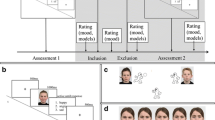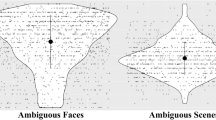Abstract
The interpersonal theories of depression highlight the role of interpersonal stress and individual’s sensitivity to social rejection in the development of depression. However, previous research has tested their respective effects, whereas whether or not these two factors interact to affect depression, especially in ways of differential susceptibility or diathesis-stress, remains unknown. By adopting a morphed facial expressions recognition paradigm, the current study investigated the potential moderating role of perceptual sensitivity to facial expressions, especially that to angry expression which signaled social rejection, in the association between interpersonal stress and adolescent depressive symptoms. A total of 186 Chinese late adolescents (Mage = 21.16 ± 1.81 years; 73.7% females) participated in this study. The results demonstrated that perceptual sensitivity for angry faces, but not sad or happy faces, functioned as a plasticity factor significantly moderating the effect of interpersonal stress on depressive symptoms, which was consistent with hypothesis of differential susceptibility rather than diathesis-stress. No interactions were observed regarding non-interpersonal dimensions. These results were robust and survived a series of sensitivity analyses, including k-fold cross-validation test. The current findings highlight the crucial role of perceptual sensitivity to angry expression in explaining individual differences behind the links between interpersonal stress and adolescent depressive symptoms.


Similar content being viewed by others
Notes
To be noted, this 85% screening data criterion is strict for sadness given that sadness is more difficult to identify than anger and happiness, either prototypes of expressions or expressions with each signal strength, and no matter among computer-generated faces or photographic natural faces and natural faces in daily life (e.g., Huang et al., 2012; Montagne et al., 2007). Extant research has showed that, identification accuracy for angry and happy prototypes ranged from 85% ~ 100%, whereas sad prototype was only identified at a rate of 65% ~ 85% (e.g., Huang et al., 2012; Montagne et al., 2007). This might because sadness involves relatively subtle muscle changes in the faces (Biehl et al., 1997). Consistently, the current data revealed similar identification accuracy for these prototypes (angry: 97%; happy: 96%; sad: 85%). Accordingly, a sensitivity analysis was conducted by using a lax screening data criterion of 65% identification accuracy for sadness (16.7% data for sadness was excluded). The results showed that the main effect of perceptual sensitivity to sadness and its interaction effects with interpersonal and non-interpersonal stress remained non-significant (p ≥ 0.017, the threshold of multiple corrected p-value was 0.0083).
References
Abaied, J. L., & Rudolph, K. D. (2014). Family relationships, emotional processes, and adolescent depression. In C. S. Richards & M. W. O’Hara (Eds.), The Oxford handbook of depression and comorbidity (pp. 460–475). Oxford University Press.
Bakermans-kranenburg, M. J., & van IJzendoorn, M. H. (2015). The hidden efficacy of interventions: Gene × environment experiments from a differential susceptibility perspective. Annual Review of Psychology, 66, 381–409. https://doi.org/10.1146/annurev-psych-010814-015407.
Beevers, C. G., Wells, T. T., Ellis, A. J., & Fischer, K. (2009). Identification of emotionally ambiguous interpersonal stimuli among dysphoric and nondysphoric individuals. Cognitive Therapy and Research, 33(3), 283–290. https://doi.org/10.1007/s10608-008-9198-6.
Belsky, J., & Pluess, M. (2009). Beyond diathesis stress: Differential susceptibility to environmental influences. Psychological Bulletin, 135(6), 885–908. https://doi.org/10.1037/a0017376.
Bick, J., Luyster, R., Fox, N. A., Zeanah, C. H., & Nelson, C. A. (2017). Effects of early institutionalization on emotion processing in 12-year-old youth. Development and Psychopathology, 29(5), 1749–1761. https://doi.org/10.1017/S0954579417001377.
Biehl, M., Matsumoto, D., Ekman, P., Hearn, V., Heider, K., Kudoh, T., & Ton, V. (1997). Matsumoto and Ekman’s Japanese and Caucasian facial expressions of emotion (JACFEE): Reliability data and cross-national differences. Journal of Nonverbal Behavior, 21(1), 3–21. https://doi.org/10.1023/A:1024902500935.
Bodenschatz, C. M., Skopinceva, M., Russ, T., & Suslow, T. (2019). Attentional bias and childhood maltreatment in clinical depression—An eye-tracking study. Journal of Psychiatric Research, 112, 83–88. https://doi.org/10.1016/j.jpsychires.2019.02.025.
Bone, J. K., Lewis, G., Button, K. S., Duffy, L., Harmer, C. J., Munafò, M. R., Penton-Voak, I. S., Wiles, N. J., & Lewis, G. (2019). Variation in recognition of happy and sad facial expressions and self-reported depressive symptom severity: A prospective cohort study. Journal of Affective Disorders, 257, 461–469. https://doi.org/10.1016/j.jad.2019.06.025.
Bowling, N. C., & Banissy, M. J. (2017). Emotion expression modulates perception of animacy from faces. Journal of Experimental Social Psychology, 71, 83–95. https://doi.org/10.1016/j.jesp.2017.02.004.
Calder, A. J., Young, A. W., Perrett, D. I., Etcoff, N. L., & Rowland, D. (1996). Categorical perception of morphed facial expressions. Visual Cognition, 3(2), 81–117. https://doi.org/10.1080/713756735.
Cao, C., Sun, K., Cao, L., & Li, F. (2021). Monoaminergic multilocus genetic variants interact with stressful life events in predicting changes in adolescent anxiety symptoms: A one-year longitudinal study. Journal of Youth and Adolescence, 50(11), 2194–2207. https://doi.org/10.1007/s10964-021-01496-y.
Chen, Q., Wang, X.-Q., He, X.-X., Ji, L.-J., Liu, M., & Ye, B. (2021). The relationship between search for meaning in life and symptoms of depression and anxiety: Key roles of the presence of meaning in life and life events among Chinese adolescents. Journal of Affective Disorders, 282, 545–553. https://doi.org/10.1016/j.jad.2020.12.156.
Cisler, J. M., & Koster, E. H. W. (2010). Mechanisms of attentional biases towards threat in anxiety disorders: An integrative review. Clinical Psychology Review, 30(2), 203–216. https://doi.org/10.1016/j.cpr.2009.11.003.
Cohen, J. (1988). Statistical power analysis for the behavioral sciences (2nd ed.). Hillsdale, NJ: Lawrence Earlbaum Associates.
Fischer, A. H., & Roseman, I. J. (2007). Beat them or ban them: The characteristics and social functions of anger and contempt. Journal of Personality and Social Psychology, 93(1), 103–115. https://doi.org/10.1037/0022-3514.93.1.103.
Fugate, J. M. B. (2013). Categorical perception for emotional faces. Emotion Review: Journal of the International Society for Research on Emotion, 5(1), 84–89. https://doi.org/10.1177/1754073912451350.
GBD 2019 Diseases and Injuries Collaborators, Vos, T., Lim, S. S., Abbafati, C., Abbas, K. M., Abbasi, M., Abbasifard, M., Abbasi-Kangevari, M., Abbastabar, H., Abd-Allah, F., Abdelalim, A., Abdollahi, M., Abdollahpour, I., Abolhassani, H., Aboyans, V., Abrams, E. M., Abreu, L. G., Abrigo, M. R. M., Abu-Raddad, L. J., Abushouk, A. I., & Murray, C. J. L. (2020). Global burden of 369 diseases and injuries in 204 countries and territories, 1990–2019: A systematic analysis for the Global Burden of Disease Study 2019. The Lancet, 396(10258), 1204–1222. https://doi.org/10.1016/S0140-6736(20)30925-9.
Gotlib, I. H., & Joormann, J. (2010). Cognition and depression: Current status and future directions. Annual Review of Clinical Psychology, 6, 285–312. https://doi.org/10.1146/annurev.clinpsy.121208.131305.
Gottman, J. M., & Levenson, R. W. (2002). A two-factor model for predicting when a couple will divorce: Exploratory analyses using 14-year longitudinal data. Family Process, 41(1), 83–96. https://doi.org/10.1111/j.1545-5300.2002.40102000083.x.
Hames, J. L., Hagan, C. R., & Joiner, T. E. (2013). Interpersonal processes in depression. Annual Review of Clinical Psychology, 9, 355–377. https://doi.org/10.1146/annurev-clinpsy-050212-185553.
Hankin, B. L. (2015). Depression from childhood through adolescence: Risk mechanisms across multiple systems and levels of analysis. Current Opinion in Psychology, 4, 13–20. https://doi.org/10.1016/j.copsyc.2015.01.003.
Heerdink, M. W., van Kleef, G. A., Homan, A. C., & Fischer, A. H. (2015). Emotional expressions as social signals of rejection and acceptance: Evidence from the affect misattribution paradigm. Journal of Experimental Social Psychology, 56, 60–68. https://doi.org/10.1016/j.jesp.2014.09.004.
Huang, C. L.-C., Hsiao, S., Hwu, H.-G., & Howng, S.-L. (2012). The Chinese Facial Emotion Recognition Database (CFERD): A computer-generated 3-D paradigm to measure the recognition of facial emotional expressions at different intensities. Psychiatry Research, 200(2–3), 928–932. https://doi.org/10.1016/j.psychres.2012.03.038.
James, K. M., Miskovic, V., Woody, M. L., Owens, M., Connolly, E., & Gibb, B. E. (2022). Attentional capture by angry faces in girls who self-injure: Evidence from steady state visual evoked potentials. Suicide and Life-Threatening Behavior, 52(6), 1149–1158. https://doi.org/10.1111/sltb.12909.
Jiang, S. L., & Yang, W. H. (2020). Factor structure of the beck depression inventory-II of Chinese version among Chinese undergraduates. Chinese Journal of Clinical Psychology, 28(02), 299–305. https://doi.org/10.16128/j.cnki.1005-3611.2020.02.017.
Jones, J. D., Long, E. E., Hankin, B. L., Gallop, R., Davis, M., & Young, J. F. (2023). Personalized depression prevention reduces dependent stressors among adolescents: Results from a randomized controlled trial. Journal of clinical child and adolescent psychology, 53, 1–14. https://doi.org/10.1080/15374416.2023.2188562. Advance online publication.
Keren, H., O’Callaghan, G., Vidal-Ribas, P., Buzzell, G. A., Brotman, M. A., Leibenluft, E., Pan, P. M., Meffert, L., Kaiser, A., Wolke, S., Pine, D. S., & Stringaris, A. (2018). Reward processing in depression: A conceptual and meta-analytic review across fMRI and EEG studies. American Journal of Psychiatry, 175(11), 1111–1120. https://doi.org/10.1176/appi.ajp.2018.17101124.
Krause, F. C., Linardatos, E., Fresco, D. M., & Moore, M. T. (2021). Facial emotion recognition in major depressive disorder: A meta-analytic review. Journal of Affective Disorders, 293, 320–328. https://doi.org/10.1016/j.jad.2021.06.053.
Kuhn M. (2023). caret: Classification and Regression Training. Available online: https://cran.r-project.org/web/packages/caret/.
Leyman, L., De Raedt, R., Schacht, R., & Koster, E. H. W. (2007). Attentional biases for angry faces in unipolar depression. Psychological Medicine, 37(3), 393–402. https://doi.org/10.1017/S003329170600910X.
Li, D., Zhang, W., Li, X., Zhen, S., & Wang, Y. (2010). Stressful life events and problematic Internet use by adolescent females and males: A mediated moderation model. Computers in Human Behavior, 26(5), 1199–1207. https://doi.org/10.1016/j.chb.2010.03.031.
Liu, W., Huang, J., Wang, L., Gong, Q., & Chan, R. C. K. (2012). Facial perception bias in patients with major depression. Psychiatry Research, 197(3), 217–220. https://doi.org/10.1016/j.psychres.2011.09.021.
Liu, X. C., Liu, L. Q., Yang, J., Chai, F. X., Wang, A. Z., Sun, L. M., zhao, G. F., & Ma, D. D. (1997). Reliability and validity test of adolescent life event scale. Chinese Journal of Clinical Psychology, 5, 34–36.
Lopez-Duran, N. L., Kuhlman, K. R., George, C., & Kovacs, M. (2013). Facial emotion expression recognition by children at familial risk for depression: High-risk boys are oversensitive to sadness. Journal of Child Psychology and Psychiatry, and Allied Disciplines, 54(5), 565–574. https://doi.org/10.1111/jcpp.12005.
Losiewicz, O. M., Metts, A. V., Zinbarg, R. E., Hammen, C., & Craske, M. G. (2023). Examining the indirect contributions of irritability and chronic interpersonal stress on symptoms of anxiety and depression in adolescents. Journal of Affective Disorders, 329, 350–358. https://doi.org/10.1016/j.jad.2023.02.125.
Mackin, D. M., Perlman, G., Davila, J., Kotov, R., & Klein, D. N. (2017). Social support buffers the effect of interpersonal life stress on suicidal ideation and self-injury during adolescence. Psychological Medicine, 47(6), 1149–1161. https://doi.org/10.1017/S0033291716003275.
Monroe, S. M., & Simons, A. D. (1991). Diathesis-stress theories in the context of life stress research: Implications for the depressive disorders. Psychological Bulletin, 110(3), 406–425. https://doi.org/10.1037/0033-2909.110.3.406.
Monroe, S. M., Rohde, P., Seeley, J. R., & Lewinsohn, P. M. (1999). Life events and depression in adolescence: Relationship loss as a prospective risk factor for first onset of major depressive disorder. Journal of Abnormal Psychology, 108(4), 606–614. https://doi.org/10.1037//0021-843x.108.4.606.
Montagne, B., Kessels, R. P. C., De Haan, E. H. F., & Perrett, D. I. (2007). The emotion recognition task: A paradigm to measure the perception of facial emotional expressions at different intensities. Perceptual and Motor Skills, 104(2), 589–598. https://doi.org/10.2466/pms.104.2.589-598.
National Institute of Mental Health. Major Depression (2022). https://www.nimh.nih.gov/health/statistics/major-depression.
Neel, R., Becker, D. V., Neuberg, S. L., & Kenrick, D. T. (2012). Who expressed what emotion? Men grab anger, women grab happiness. Journal of Experimental Social Psychology, 48(2), 583–586. https://doi.org/10.1016/j.jesp.2011.11.009.
Nyquist, A. C., & Luebbe, A. M. (2020). An emotion recognition–awareness vulnerability hypothesis for depression in adolescence: A systematic review. Clinical Child and Family Psychology Review, 23(1), 27–53. https://doi.org/10.1007/s10567-019-00302-3.
Owens, S. A., Helms, S. W., Rudolph, K. D., Hastings, P. D., Nock, M. K., & Prinstein, M. J. (2019). Interpersonal stress severity longitudinally predicts adolescent girls’ depressive symptoms: The moderating role of subjective and HPA axis stress responses. Journal of Abnormal Child Psychology, 47(5), 895–905. https://doi.org/10.1007/s10802-018-0483-x.
Pagliaccio, D., Kumar, P., Kamath, R. A., Pizzagalli, D. A., & Auerbach, R. P. (2023). Neural sensitivity to peer feedback and depression symptoms in adolescents: A 2-year multiwave longitudinal study. Journal of Child Psychology and Psychiatry, and Allied Disciplines, 64(2), 254–264. https://doi.org/10.1111/jcpp.13690.
Pickett, C. L., & Gardner, W. L. (2005). The social monitoring system: Enhanced sensitivity to social cues as an adaptive response to social exclusion. In K. D. Williams, J. P. Forgas, & W. von Hippel (Eds.), The social outcast: Ostracism, social exclusion, rejection, and bullying (pp. 213–226). Psychology Press.
Pollak, S. D., & Kistler, D. J. (2002). Early experience is associated with the development of categorical representations for facial expressions of emotion. Proceedings of the National Academy of Sciences, 99(13), 9072–9076. https://doi.org/10.1073/pnas.142165999.
Roesch, E. B., Tamarit, L., Reveret, L., Grandjean, D., Sander, D., & Scherer, K. R. (2011). FACSGen: A tool to synthesize emotional facial expressions through systematic manipulation of facial action units. Journal of Nonverbal Behavior, 35(1), 1–16. https://doi.org/10.1007/s10919-010-0095-9.
Rudolph, K. D., Davis, M. M., Modi, H. H., Fowler, C., Kim, Y., & Telzer, E. H. (2020). Differential susceptibility to parenting in adolescent girls: Moderation by neural sensitivity to social cues. Journal of Research on Adolescence: The Official Journal of the Society for Research on Adolescence, 30(Suppl 1), 177–191. https://doi.org/10.1111/jora.12458.
Rudolph, K. D., Skymba, H. V., Modi, H. H., Davis, M. M., Yan Sze, W., Rosswurm, C. P., & Telzer, E. H. (2021). How does peer adversity “Get inside the Brain?” Adolescent girls’ differential susceptibility to neural dysregulation of emotion following victimization. Developmental Psychobiology, 63(3), 481–495. https://doi.org/10.1002/dev.22022.
Rutter, L. A., Dodell-Feder, D., Vahia, I. V., Forester, B. P., Ressler, K. J., Wilmer, J. B., & Germine, L. (2019). Emotion sensitivity across the lifespan: Mapping clinical risk periods to sensitivity to facial emotion intensity. Journal of Experimental Psychology. General, 148(11), 1993–2005. https://doi.org/10.1037/xge0000559.
Sanford, K., & Rowatt, W. C. (2004). When is negative emotion positive for relationships? An investigation of married couples and roommates. Personal Relationships, 11(3), 329–354. https://doi.org/10.1111/j.1475-6811.2004.00086.x.
Schriber, R. A., & Guyer, A. E. (2016). Adolescent neurobiological susceptibility to social context. Developmental Cognitive Neuroscience, 19, 1–18. https://doi.org/10.1016/j.dcn.2015.12.009.
Schulte-van Maaren, Y. W. M., Carlier, I. V. E., Zitman, F. G., van Hemert, A. M., de Waal, M. W. M., van der Does, A. J. W., van Noorden, M. S., & Giltay, E. J. (2013). Reference values for major depression questionnaires: The Leiden routine outcome monitoring study. Journal of Affective Disorders, 149(1–3), 342–349. https://doi.org/10.1016/j.jad.2013.02.009.
Shorey, S., Ng, E. D., & Wong, C. H. J. (2022). Global prevalence of depression and elevated depressive symptoms among adolescents: A systematic review and meta-analysis. The British Journal of Clinical Psychology, 61(2), 287–305. https://doi.org/10.1111/bjc.12333.
Slagt, M., Dubas, J. S., Deković, M., & van Aken, M. A. G. (2016). Differences in sensitivity to parenting depending on child temperament: A meta-analysis. Psychological Bulletin, 142(10), 1068–1110. https://doi.org/10.1037/bul0000061.
Slavich, G. M., Thornton, T., Torres, L. D., Monroe, S. M., & Gotlib, I. H. (2009). Targeted rejection predicts hastened onset of major depression. Journal of Social and Clinical Psychology, 28(2), 223–243. https://doi.org/10.1521/jscp.2009.28.2.223.
van Kleef, G. A., & Côté, S. (2022). The social effects of emotions. Annual Review of Psychology, 73(1), 629–658. https://doi.org/10.1146/annurev-psych-020821-010855.
Vrshek-Schallhorn, S., Stroud, C. B., Mineka, S., Hammen, C., Zinbarg, R. E., Wolitzky-Taylor, K., & Craske, M. G. (2015). Chronic and episodic interpersonal stress as statistically unique predictors of depression in two samples of emerging adults. Journal of Abnormal Psychology, 124(4), 918–932. https://doi.org/10.1037/abn0000088.
Wells, T. T., Beevers, C. G., Robison, A. E., & Ellis, A. J. (2010). Gaze behavior predicts memory bias for angry facial expressions in stable dysphoria. Emotion, 10(6), 894–902. https://doi.org/10.1037/a0020022.
Widaman, K. F., Helm, J. L., Castro-Schilo, L., Pluess, M., Stallings, M. C., & Belsky, J. (2012). Distinguishing ordinal and disordinal interactions. Psychological Methods, 17(4), 615–622. https://doi.org/10.1037/a0030003.
Willems, R. M., der Haegen, L. V., Fisher, S. E., & Francks, C. (2014). On the other hand: Including left-handers in cognitive neuroscience and neurogenetics. Nature Reviews Neuroscience, 15(3), Article 3. https://doi.org/10.1038/nrn3679.
Wiseman, C., Lawrence, A. D., Bisson, J. I., Hotham, J., Karl, A., & Zammit, S. (2022). Study development and protocol for a cohort study examining the impact of baseline social cognition on response to treatment for people living with post-traumatic stress disorder. European Journal of Psychotraumatology, 13(1), 2093036. https://doi.org/10.1080/20008198.2022.2093036.
Yang, X., & Stewart, S. M. (2020). The Beck Depression Inventory-II as a screening tool of depression in the Chinese adolescent population in Hong Kong: A validation study using the Composite International Diagnostic Interview as the gold standard. Asian Journal of Psychiatry, 52, 102125. https://doi.org/10.1016/j.ajp.2020.102125.
Zhang, Q. (2017). A Study on the categorical perception of facial expressions of depression tendency of undergraduates. Master’s thesis, Shandong Normal University, Jinan.
Zhou, L., Yang, A., Meng, M., & Zhou, K. (2022). Emerged human-like facial expression representation in a deep convolutional neural network. Science Advances, 8(12), eabj4383. https://doi.org/10.1126/sciadv.abj4383.
Acknowledgements
The authors acknowledge and thank all the adolescents that participated in the current study, as well as research assistants who helped with data collection.
Funding
This study was supported by Social Science Planning Fund of Shandong Province (18DJYJ01).
Data Sharing and DeclarationThe datasets analyzed during the current study are not publicly available but are available from the corresponding author on reasonable request.
Author information
Authors and Affiliations
Contributions
Y.X. participated in data analysis and interpretation of the data and drafted the paper; C.C. conceived of the study, participated in its design and helped to draft the paper. All authors read and approved the final paper.
Corresponding author
Additional information
Publisher’s note Springer Nature remains neutral with regard to jurisdictional claims in published maps and institutional affiliations.
Supplementary Information
Rights and permissions
Springer Nature or its licensor (e.g. a society or other partner) holds exclusive rights to this article under a publishing agreement with the author(s) or other rightsholder(s); author self-archiving of the accepted manuscript version of this article is solely governed by the terms of such publishing agreement and applicable law.
About this article
Cite this article
Xu, Y., Cao, C. Interpersonal Stress and Late Adolescent Depressive Symptoms: Moderation by Perceptual Sensitivity to Facial Expression of Anger. J. Youth Adolescence 52, 2592–2605 (2023). https://doi.org/10.1007/s10964-023-01849-9
Received:
Accepted:
Published:
Issue Date:
DOI: https://doi.org/10.1007/s10964-023-01849-9




